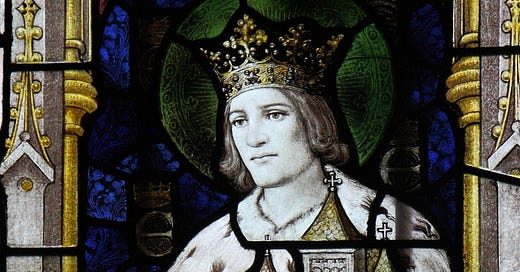Beginning her political career in the cradle
The role of Princess Eanflæd in the conversion of Edwin, king of the Northumbrians, c. A.D. 626.
Kingdom of Northumbria, A.D. 626
She froze.
Did he just…? No… He couldn’t have… Could he?
The missionary, Paulinus, looked at her across the table, before returning his gaze to the king, sitting directly opposite him. His face mirrored the queen’s horror, her confusion.
The silence in the hall was heavy and oppressive. All movement had ceased when the king had spoken, so shocking were his words. Twenty or so sets of eyes, belonging to all those in the great hall, were trained on their king, waiting to hear what he would say next.
“My lord, I, uh..” Paulinus fumbled his words. “What did you say, my lord?”
“Our daughter, Eanflæd. If you are right, and your God is the true God, you can have her.”
Oh gosh, Æthelburh thought. He did say it.
“For one of your monasteries. She would be a great gift, no? A symbol of my appreciation for you?”
He looked around the table, face glowing. He clearly thought he had presented the most brilliant idea but there was a menacing edge to his expression that unnerved those around him.
Æthelburh was holding the infant close to her body, where she could keep her warm against the early spring chill. Eanflæd was only a few weeks old, still living in skin that folded and creased at every opportunity, looking as if it were too big for her. Her eyes barely opened each day; when they did, they were deep blue wells of a life waiting to unfurl. Occasionally she would stretch out her arms high above her, wriggling her head and yawning as she did so.
Paulinus looked to Æthelburh, unsure what to do next.
“Edwin, please, think about this.” She was panicking.
As a Kentish princess, granddaughter of a Merovingian Frankish king, she had been brought up in the Christian religion by her mother, Queen Bertha. She knew that the Christian God was the true God, that Paulinus would be proved right - and that she would lose her daughter if Edwin went through with this deal.
There had to be another way.
Who was Edwin?

Edwin was a king of the Northumbrians during the early seventh century.1 He was married to Æthelburh, daughter of King Æthelberht of Kent, and they had several children. He was the first Northumbrian king to become a Christian, through the missionary efforts of Paulinus, a bishop in the fledgling English church. Edwin died at the battle of Hatfield Chase in either A.D. 632 or 633, which led to the exile of his wife and children, and the division of his kingdom.
Bede, in his Ecclesiastical History (written c. A.D. 731), included Edwin in his list of ‘overlords’.2 This role has been much debated, but it seems to have denoted a king who held some sort of power over the other kingdoms in early Anglo-Saxon England. Bede said the following about Edwin’s time as overlord:
Edwin had still greater power [than those who had been overlords before him] and ruled over all the inhabitants of Britain, English and Britons alike, except for Kent only. He even brought under English rule the Mevanian Islands (Anglesey and Man) which lie between England and Ireland and belong to the Britons.3
Edwin was, therefore, one of the most powerful Anglo-Saxon kings of the early seventh century.
Why did his conversion matter?
Living in twenty-first-century England, a country that is largely post-Christian, it can be difficult to understand the political, social and cultural significance of the Conversion to Christianity that took place in these islands during the seventh century.
This was about more than just personal faith or beliefs: it was about political affiliation and the shaping of kingdoms. When Æthelberht of Kent converted to Christianity, he signalled a shift in his political allegiance away from Scandinavia and western Britain, and towards Francia and the Mediterranean. This is also evident in his adoption of Roman-style written laws, not previously in use in the Anglo-Saxon kingdoms.
Would Edwin do the same?
As the third in Bede’s list of seven overlords, after Æthelberht, to do so would be influential beyond the boundaries of his own kingdom. He had the power to set the direction in which other kingdoms would be expected to travel, so the decision of whether to convert would not have been an easy one for him. Northumbria had long had close ties with Scotland, the heartland of Irish-influenced Christianity.
How did it happen?
The major source for Edwin’s conversion is by Bede. His story is a little confused, which has led some historians to query whether he was conflating several variant legends in order to give the illusion of a coherent narrative.
It goes as follows.
When his predecessor Æthelfrith was on the throne, Edwin was forced into exile at the East Anglian court. During this time he had a heavenly vision that directed him to how he could win the Northumbrian kingdom for himself. It is clear from the narrative that Bede believed this vision to have been from God.
Later, Edwin sent to Kent to ask for Æthelburh’s hand in marriage but received the following response:
The answer was that it was not lawful for a Christian maiden to be given in marriage to a heathen for fear that the faith and mysteries of the heavenly King might be profaned by a union with a king who was an utter stranger to the worship of the true God.4
Edwin promised not to put any obstacles in the way of Æthelburh’s worship and so the two were betrothed.
Paulinus was consecrated bishop by the Archbishop of Canterbury and sent with Æthelburh to her new kingdom, much as Bishop Liudhard had accompanied her mother Bertha when she travelled from Francia to Kent for her marriage.
Then, in c. A.D. 626, Edwin was the victim of an attempted assassination, sent by his enemy Cwichelm, king of the West Saxons. His daughter Eanflæd happened to be born on the same night that the attempt on his life was made. Edwin promised that he would give his daughter to be baptised if God granted him life and victory over Cwichelm. He was victorious, but refused to serve Christ, despite his pledge.
His eventual conversion came about, finally, following a discussion with his ‘loyal chief men and his counsellors’, including the chief of the priests, Coifi.5 Edwin was finally convinced when, after teaching from Paulinus, Coifi exclaimed, ‘I advise your Majesty that we should promptly abandon and commit to the flames the temples and the altars which we have held sacred without reaping any benefit.’6 Edwin was baptised at York on Easter Day A.D. 627.
So, in Bede’s narrative, there seem to be three major events in Edwin’s conversion:
His dream, or vision, while in exile in East Anglia
His promise to convert if he defeated Cwichelm
His discussion with his chief men and the missionary Paulinus
What really happened to Eanflæd?
Thankfully, she was not taken from the Northumbrian court shortly after her birth: that was my creative thinking around the circumstances leading to her baptism. There is so much left out of the historical records, as they couldn’t possibly have included all the details of interest to us today, and I think this gives the historian (or historical fiction writer, perhaps) great scope to play with the events that lay behind the narratives that have survived.
Eanflæd was, however, used by Edwin in his conversion: she was, for him, an object of power, despite her being a fragile, dependent infant. It probably isn’t fair to say that he wouldn’t have converted without her, but she clearly mattered enough to Edwin for him to stake his conversion on her.
Eanflæd went on to marry King Oswiu of the Northumbrians, who had a major role in the Synod of Whitby, decisive for the strengthening of Christianity within the kingdom. She stood up to her husband, another of Bede’s overlords, refusing to back down on her theological convictions and bringing the whole of the English Church together for debate.
After Oswiu’s death (c. A.D. 670), she retired to the Abbey of Whitby, which she became abbess of in c. A.D. 680. This was one of the most influential ecclesiastical institutions of the day. She died some time after c. A.D. 685.
So, in these ways, Eanflæd influenced the politics of the seventh century from her very earliest days until her last days: as a baby with her father’s conversion, as a queen with her role in the Easter Controversy, and as the abbess of a major Northumbrian abbey.
I hope you enjoyed reading this post! To receive more like this, do consider becoming a free or paid subscriber using the button below.
This post forms part of my contribution to the Sparkle on Substack Essay Club, hosted by
. It’s Essay 1/24.At this time, it’s more accurate to speak of kingdoms as people groups than as geographically-defined territories.
Bede, HE, II.5: tr. McClure & Collins, p.78.
Ibid, p.78.
Ibid, II.9: p.84.
Ibid, II.13, p.95.
Ibid, p.96.











